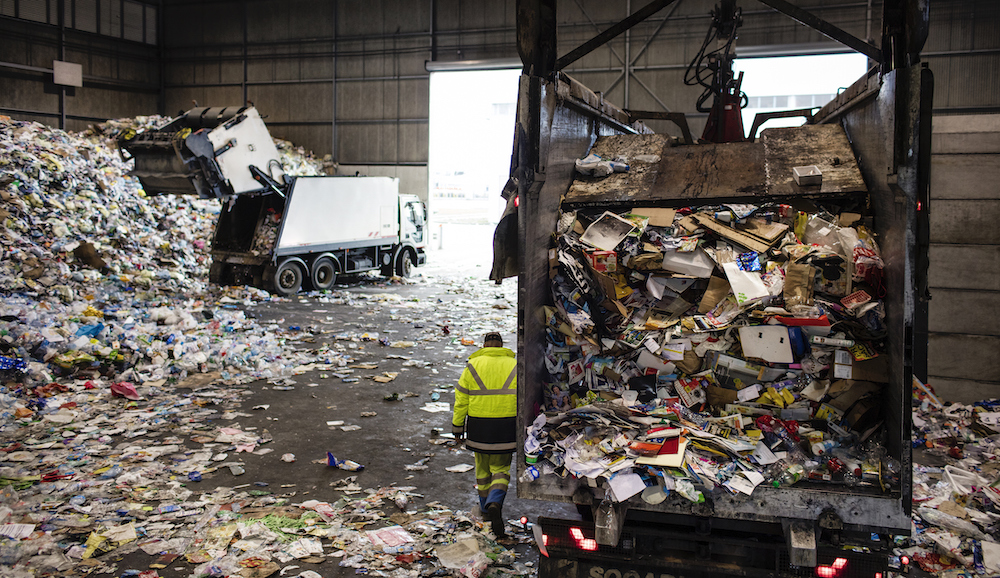- Waste management companies are looking to AI to handle safety issues during the pandemic.
- More than two dozen startups are working to make managing waste and recycling more efficient.
- Increased recycling and better management of garbage may cut waste globally.
Sorting garbage is dirty, stinky work. Low-paying, with a risk of getting hurt by sharp objects in the trash, workers leave as soon as they can. The deadly coronavirus pandemic has only made things worse for them.
That’s why the calls to AMP Robotics have been nonstop from potential customers inquiring about the company’s artificial intelligence-powered robots that identify, sort and process waste. Its system processes municipal garbage, waste from electronics and construction debris at about 80 items a minute, twice as fast as humans and with more accuracy, the company says.
“The productivity is aimed at solving a chronic labor shortage” that the industry has long suffered, Chris Wirth, vice president of marketing, policy and business development at AMP Robotics, told Karma. He added companies now recognize that the robots also address “significant safety and workplace issues” that have become more apparent because of the health crisis, which has killed more than 92,000 people worldwide.
“Waste management companies are worried about their workers,” Wirth said.
More than two dozen startups are looking to automate, cut costs and improve efficiencies in the waste processing and recycling system, according to PitchBook data. Venture capital investment in the waste management sector has grown for the past decade, jumping after China banned U.S. waste three years ago. Atlanta-based Rubicon Global raised $161 million in series E funding, led by New Zealand Superannuation Fund, in the largest deal in the sector last year.
The field is growing and the industry will continue to adopt the technology as it advances, Matt Todd, a senior consultant at Resource Recycling Systems, told Karma. Just two years ago, robots could pick about 30 to 40 items a minute; Now, they do 75 to 80, he said. Moreover, the price point for the robots are coming down to where it makes economic sense compared to the wages paid to workers.
“Recyclers are figuring out the best ways to use the technology,” he said.
AMP Robotics’ machine-learning software combines with robots that pull recyclable items from a conveyor belt and throw them into sorting bins. Every robot deployed at AMP Robotics’ 15 clients feeds data back to a “central brain” that updates the software and makes the system more efficient. In effect, a robot at a California sorting facility is helping robots in Colorado, Minnesota and Florida become better at identifying items that can be recycled.
“That’s what is really powerful,” Wirth said. The AI is increasing the consistency and accuracy of the picking to the point where it is becoming possible for items to be sorted by more specific criteria that can include purity, color and texture.
Making recycling more efficient could cut down on global waste, which is expected to increase from 2 billion metric tons annually in 2016 to 3.4 billion metric tons in 2050, according to the World Bank. The U.S. could do more to help, since the recycling rate is only a bit over 35%, according to the Environmental Protection Agency’s latest figures.
Founded in 2015, AMP Robotics raised $16 million in series A cash in November, led by Sequoia Capital, bringing its total funding to $22.6 million.
The Closed Loop Venture Fund has Denver area-based AMP Robotics in its portfolio because it is a “great example of a company changing the economics of recycling via automation,” according to Danielle Joseph, the executive director at Closed Loop Partners who leads the fund.
“Today’s challenging circumstances related to COVID-19 demonstrate the greater need for more efficient, localized, automated and transparent supply chains,” she said in an emailed comment to Karma. “Innovative robotic and AI companies, like AMP Robotics, are transforming the industry.”
The transformation has been going on for years, which is why Steve Alexander, president of the Association of Plastic Recyclers, told Karma that the pandemic may not have much impact on the sector.
“Automation is happening already,” Alexander told Karma. “It’s not going to slow it down.”

























